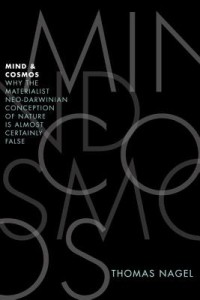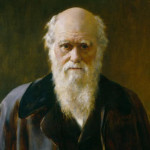Searching Beyond Darwin: Exploring “Mind and Cosmos”
by John Burger
Filed under Book Reviews
The controversy Thomas Nagel set off a year ago when he published a slim volume called Mind and Cosmos: Why the Materialist Neo-Darwinian Conception of Nature Is Almost Certainly False (Oxford University Press, 2012) is still echoing through the halls of academia. The question is: Was that the sound of a great career crashing to the ground we heard, or the first whacks of a sledgehammer against the Berlin Wall of materialist philosophy?
 Nagel has taught for 33 years in one of the country’s most prestigious philosophy departments, at New York University. His essay “What Is It Like to Be a Bat?” became required reading for college students in the 1970s. In Mind and Cosmos, he argues that the materialist view of life cannot explain everything—that there must be something more to explain things like consciousness, intentionality, and value:
Nagel has taught for 33 years in one of the country’s most prestigious philosophy departments, at New York University. His essay “What Is It Like to Be a Bat?” became required reading for college students in the 1970s. In Mind and Cosmos, he argues that the materialist view of life cannot explain everything—that there must be something more to explain things like consciousness, intentionality, and value:
"For a long time I have found the materialist account of how we and our fellow organisms came to exist hard to believe, including the standard version of how the evolutionary process works,” he writes. “The more details we learn about the chemical basis of life and the intricacy of the genetic code, the more unbelievable the standard historical account becomes...It seems to me that, as it is usually presented, the current orthodoxy about the cosmic order is the product of governing assumptions that are unsupported, and that it flies in the face of common sense."
His argument was greeted with a firestorm of controversy.
A Soul Longing for Reassurance?
“Nagel’s soul longs for what he calls ‘reassuring’ explanations,” wrote Eric Schliesser, a blogger at New APPS: Art, Politics, Philosophy, Science. “...Nagel closes his book with ‘the human will to believe is inexhaustible.’ Quoting Psalm 139, Alvin Plantinga is surely right to insist that if Nagel ‘followed his own arguments wherever they lead,’ Nagel would end up with (Christianized) theism. Some such religion is a useful adaptation for souls longing for reassurance.” Plantinga is a Christian who taught philosophy at the University of Notre Dame.
But although Nagel, who was born in Belgrade in 1937, is questioning a worldview that has no room for God, he is still a committed atheist. He writes in Mind and Cosmos:
“I do not find theism any more credible than materialism as a comprehensive worldview. ... But would an alternative secular conception be possible that acknowledged mind and all that it implies, not as the expression of divine intention but as a fundamental principle of nature along with physical law?”
In August, eleven months after the book debuted, Nagel responded to the criticism with a New York Times blog post. “Even though the theistic outlook, in some versions, is consistent with the available scientific evidence, I don’t believe it, and am drawn instead to a naturalistic, though non-materialist, alternative....,” he wrote.
But he added that “even some theists might find this acceptable; since they could maintain that God is ultimately responsible for such an expanded natural order, as they believe he is for the laws of physics.”
Nagel continues to generate probing criticism in academia and the press.
Branded a Heretic
“There is a sense in which the reaction to Nagel by other philosophers is more interesting than any positive contributions Nagel has to make on these big issues,” Notre Dame philosophy professor Alfred Freddoso said in a recent interview. “The very fact that such a prominent and respected philosopher has challenged the reigning orthodoxy, i.e., 'the materialist neo-Darwinian conception of nature,' as he calls it, has made him literally a heretic in the eyes of many philosophers.”
Edward Feser, a Catholic philosopher in Los Angeles, has an in-depth look at Nagel and his critics on his blog. He writes:
“As a philosopher he finds the scientism and materialist metaphysics to which most atheists are committed to be deeply problematic,” Feser wrote “and wants to try to find a middle ground position that affirms teleology or purpose in nature, avoids reductionism about consciousness and value, and yet does not lead to theism.”
Unlike the so-called “New Atheists,” Feser said in an email, Nagel is “neither an ideologue nor unwilling to take seriously the views of theists. He is important because he gives the lie to the view that you have to embrace scientism and materialism on pain of irrationalism. I think that is why the response to his book by some of his fellow atheists has been so harsh.”
Nagel seemed ready for such a response. “Almost everyone in our secular culture has been browbeaten into regarding the reductive research program as sacrosanct, on the ground that anything else would not be science,” he writes in Mind and Cosmos.
Threat to Academic Orthodoxy
In the largely atheistic environment that prevails in academia, “it was exceedingly bad news when somebody from one of the most elite departments in the world, who is highly regarded as a philosopher, says anything that could give comfort to the religious,” said John Haldane, professor of philosophy at St. Andrew’s University in Scotland, in an interview.
Two of the most prominent philosophers contesting Nagel are Daniel Dennett, co-director of the Center for Cognitive Studies at Tufts University, and Alex Rosenberg, professor of philosophy at Duke University.
“Over the years, Tom Nagel has made no secret of his visceral dislike of materialism and its ally, Darwinian thinking, but whereas some of his earlier attempts to disrupt the forward march of science into the mind were deft and imaginative—however mistaken—he is now reduced to dressing up anxious hunches as arguments that just can’t stand up to close examination,” Dennett said in an email.
“The last 400 years have given us a lot of reason to believe that the mind is the brain. That’s what makes arguments from first-person experience so interesting,” Rosenberg wrote in an email. “Start from something we know for certain—by conscious introspection—and validly derive the conclusion that physicalism is unintelligible. That was Nagel’s achievement in 'What Is It Like to Be a Bat?'. But then, he realized that the puzzle he created has much wider ramifications. It’s not neuroscience vs. first-person access to the qualitative aspects of experience. It’s consciousness vs. all of science. Since Nagel is really confident in his penetration, he didn’t have a choice. He had to write a book in which he weighed the whole of science since Newton in the balance against his own hunch, or gut feeling, or intuition about how science will turn out, and decided that what introspection tells him is more likely to be right than all the findings of science since about 1660.”
Andrew Ferguson, writing in the Weekly Standard, disputed the view that Nagel’s work is an attack on science.
“Nagel follows the materialist chain of reasoning all the way into the cul de sac where it inevitably winds up. Nagel’s touchier critics have accused him of launching an assault on science, when really it is an assault on the nonscientific uses to which materialism has been put.”
‘Stimulated’ by Intelligent Design Theory
Nagel says in Mind and Cosmos that he has been “stimulated” by arguments made by defenders of intelligent design theory:
“Even though writers like Michael Behe and Stephen Meyer are motivated at least in part by their religious beliefs, the empirical arguments they offer against the likelihood that the origin of life and its evolutionary history can be fully explained by physics and chemistry are of great interest in themselves. Even if one is not drawn to the alternative of an explanation by the actions of a designer, the problems that these iconoclasts pose for the orthodox scientific consensus should be taken seriously.”
Nagel’s “latest provocative idea is that Darwinism almost certainly can’t account for what we know about life,” Behe, a professor of biology at Lehigh University and author of Darwin’s Black Box, said in an interview. “This includes both the fantastically sophisticated molecular machinery that has been discovered recently in cells, as well as the long-recognized abilities of the human mind. Instead Nagel argues that there must be something beyond the merely physical attributes of the universe to account for these. Consistent Darwinists find this heretical because they assume everything must be explained by matter and motion.”
Behe has no illusions about Nagel’s commitment to atheism. But, he says, “It’s great for Darwin skeptics like myself to have such an eminent intellect speak out.”
Will Nagel’s assault on the Berlin Wall of atheistic materialism lead to anything, long-term, in philosophy? Catholic philosopher Feser thinks it will. “Mind and Cosmos,” he said, “will contribute to undermining the conventional wisdom according to which there is only one side worth taking seriously in debates over mind, value, ultimate explanation, etc., namely the materialist side.”
Related Posts
Note: Our goal is to cultivate serious and respectful dialogue. While it's OK to disagree—even encouraged!—any snarky, offensive, or off-topic comments will be deleted. Before commenting please read the Commenting Rules and Tips. If you're having trouble commenting, read the Commenting Instructions.














